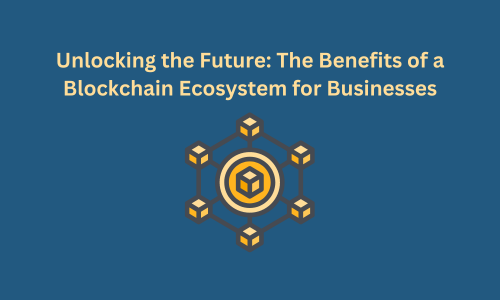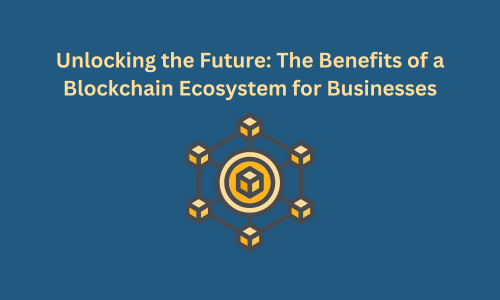


In today’s rapidly evolving digital landscape, blockchain technology is no longer a futuristic concept — it’s becoming a fundamental building block for innovative businesses. Companies are increasingly looking to leverage decentralized ecosystems to improve transparency, security, and efficiency. By integrating their platforms into a decentralized blockchain, developing wallets, and utilizing utility tokens, businesses can unlock tremendous potential. In this article, we’ll explore how adopting a blockchain ecosystem can revolutionize the way companies operate and interact with their customers.
One of the core benefits of blockchain technology is decentralization. In traditional systems, third-party intermediaries, such as banks or payment processors, are required to facilitate transactions. These intermediaries increase costs and often slow down processes. By implementing a decentralized blockchain platform, businesses can bypass these middlemen, leading to faster, more cost-effective operations.
With blockchain, trust becomes an inherent part of the system. The transparent, immutable ledger means every transaction is publicly recorded, which eliminates the need for participants to trust each other or a central authority. This decentralized trust model opens the door to global participation, allowing businesses to operate on a truly international scale without the constraints of traditional financial systems.
Data security is a critical concern for any business. On traditional platforms, sensitive customer information can be vulnerable to hacking, fraud, or tampering. However, by transitioning to a blockchain-based ecosystem, companies can ensure that their data remains secure. The immutable nature of blockchain means that once information is recorded, it cannot be altered or deleted, drastically reducing the risk of data manipulation.
Blockchain also introduces the concept of smart contracts, which are self-executing contracts with the terms directly written into code. Smart contracts automate and enforce agreements between parties, reducing human error and ensuring that contractual obligations are met. For businesses, this can simplify complex processes such as supply chain management, automating payment systems, and enforcing service agreements.
A key component of a blockchain ecosystem is the development of a digital wallet, which enables users to manage their funds, access services, and conduct transactions. In contrast to traditional wallets or accounts controlled by banks or financial institutions, blockchain wallets give users complete control over their assets. This control means that no centralized entity can freeze, seize, or manipulate a user’s funds.
In addition to offering increased control, blockchain wallets facilitate seamless, borderless transactions. Unlike traditional payment systems that may take days to process or charge high fees for international transfers, blockchain transactions are fast, inexpensive, and operate 24/7. This streamlined transaction process can be especially valuable for businesses that operate globally, as it allows for real-time transactions without geographical barriers.
At the heart of a blockchain-based ecosystem is the use of a utility token. A utility token is a digital asset that is specifically designed to be used within a company’s platform for accessing tools, products, and services. The benefits of introducing a utility token are multifold:
Incentivizing Participation: By offering utility tokens, businesses can encourage users to participate in their ecosystem, whether through discounts, rewards, or exclusive access to premium features. This creates a loyal and engaged user base that is invested in the platform’s growth.
Cost Efficiency: Using a native utility token can significantly reduce transaction fees. Traditional payment methods often involve costly intermediaries and lengthy processing times. With a utility token, transactions happen directly between users and the platform, resulting in lower costs and faster execution.
Tokenized Loyalty Programs: Businesses can also create tokenized loyalty programs, where users earn tokens for making purchases or engaging with the platform. These tokens can then be used for future transactions, enhancing customer retention and satisfaction.
As the utility token grows in use and demand, its value may appreciate, benefiting both the users and the company itself.
Blockchain ecosystems provide unmatched interoperability. By implementing their platform on the blockchain, companies can integrate with other blockchain-based systems, such as decentralized finance (DeFi) platforms, exchanges, or other blockchain applications. This level of flexibility allows businesses to expand their offerings and tap into additional markets or services.
For instance, companies could offer users the ability to stake their utility tokens on decentralized platforms, providing additional ways to earn rewards. This not only drives engagement but also positions the company within the broader blockchain ecosystem, increasing visibility and reach.
In an age where data privacy is a hot-button issue, blockchain ecosystems offer businesses a distinct advantage. By giving users control over their personal information, blockchain platforms enhance user trust and satisfaction. Decentralized identity solutions allow users to manage their own identities and selectively share data only when necessary. This means users can maintain privacy while still accessing the tools and services they need.
Additionally, blockchain enables anonymous or pseudonymous transactions, which can be crucial for industries where privacy is paramount. Users can interact with the platform without disclosing personal details, further enhancing trust in the system.
One of the biggest challenges for growing businesses is scalability. Traditional systems often struggle to handle an increase in users or transaction volume. Blockchain, however, offers scalability solutions like Layer-2 protocols, sharding, and sidechains, which help platforms handle large volumes of transactions without sacrificing speed or security.
Moreover, as blockchain technology continues to evolve, companies that have already integrated it into their platforms will be better positioned to adopt new advancements. Whether it’s the integration of artificial intelligence, IoT devices, or even quantum computing, blockchain ecosystems are inherently adaptable, ensuring that businesses remain at the forefront of innovation.
A well-designed blockchain ecosystem creates a self-sustaining economic model. As users interact with the platform and utility tokens circulate, the value of the ecosystem grows. Tokenomics — the economic structure behind a token — ensures that there’s a clear incentive for both users and the company to continue developing and engaging with the platform.
Additionally, companies can introduce decentralized governance models, where token holders can vote on key decisions. This creates a community-driven platform, aligning the interests of the users with the company’s growth and fostering long-term loyalty.
Many companies have already successfully implemented blockchain ecosystems. From decentralized finance platforms like Uniswap and Aave, which offer financial services without intermediaries, to companies like Brave, which rewards users with tokens for browsing the internet, blockchain is proving its utility across industries. As businesses continue to innovate, the potential for blockchain ecosystems is limitless, spanning from e-commerce to healthcare, gaming, and beyond.
Adopting a blockchain ecosystem is more than just a technological upgrade — it’s a transformational step toward a decentralized, transparent, and user-empowered future. By integrating a blockchain-based platform, developing a secure wallet, and utilizing a utility token, companies can provide better user experiences, enhance security, and drive engagement.
As more businesses begin to explore the benefits of blockchain ecosystems, those that take the lead will find themselves at the cutting edge of innovation, ready to scale, adapt, and succeed in a decentralized world.
Disclaimer: This article is provided for informational purposes only. It is not offered or intended to be used as legal, tax, investment, financial, or other advice.
